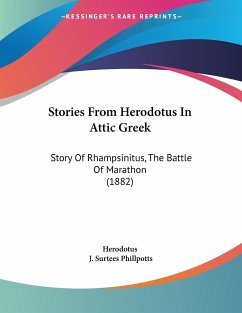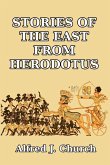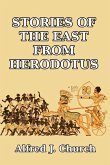1885. The father of history as Cicero called him, and a writer possessed of remarkable narrative gifts, enormous scope, and considerable charm, Herodotus has always been beloved by readers well versed in the classics. Stories of the East From Herodotus, composed during the Fifth Century BC, is Herodotus's study of the ancient world, and the relationships and conflicts between the Greek and the non-Greek peoples of the Near East, including the expansive Persian Empire, Egypt, and other lands. His histories recounted not only the human and political stories of human activities, but also included writings on geography, biology, and ethnography. Contents: The Story of King Croesus; Croesus, Wishing to Make War Against the Persians, Consulteth the Oracles; King Croesus Defeated and the City of Sardis is Taken; Croesus is Saved from Death. Of Lydia, The Lydians, and of Certain Greeks that Dwelt in Asia; The Birth and Bringing Up of Cyrus; Cyrus Overthroweth Astyages, and Taketh the Kingdom to Himself; The City of Babylon. Cyrus Taketh It; Cyrus Maketh War Against the Massagetae and Dieth; Of the Manners of Egyptians; Of Certain Kings of Egypt; Of Certain Other Kings of Egypt; The Persians Conquer Egypt; Cambyses Maketh War Upon the Nations Round About, Is Stricken with Madness, and So Dieth; The False Smerdis is Slain; The Kingdom of Darius; Babylon rebelleth Against the King, and is Taken; King Darius Maketh War Upon the Scythians; and Of the Scythians and Other Nations.
This scarce antiquarian book is a facsimile reprint of the original. Due to its age, it may contain imperfections such as marks, notations, marginalia and flawed pages. Because we believe this work is culturally important, we have made it available as part of our commitment for protecting, preserving, and promoting the world's literature in affordable, high quality, modern editions that are true to the original work.
Hinweis: Dieser Artikel kann nur an eine deutsche Lieferadresse ausgeliefert werden.
This scarce antiquarian book is a facsimile reprint of the original. Due to its age, it may contain imperfections such as marks, notations, marginalia and flawed pages. Because we believe this work is culturally important, we have made it available as part of our commitment for protecting, preserving, and promoting the world's literature in affordable, high quality, modern editions that are true to the original work.
Hinweis: Dieser Artikel kann nur an eine deutsche Lieferadresse ausgeliefert werden.








